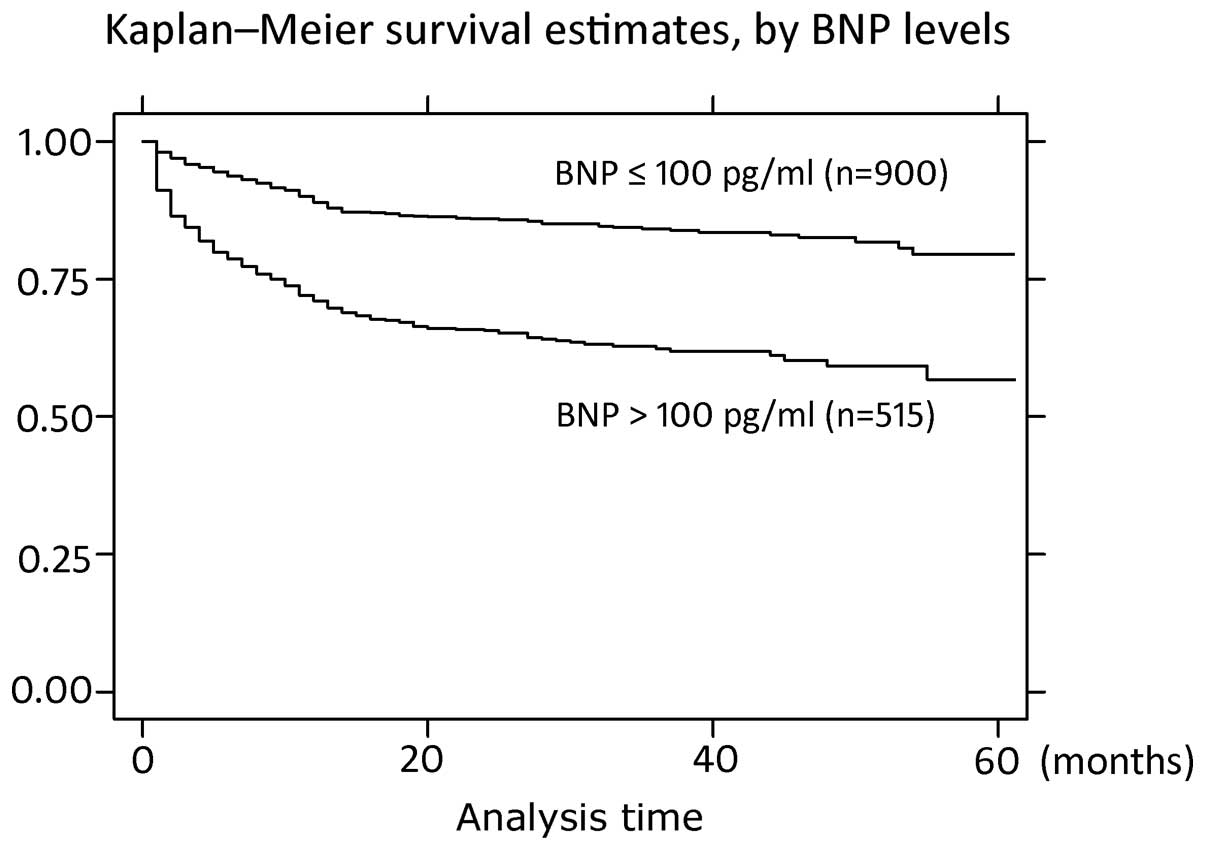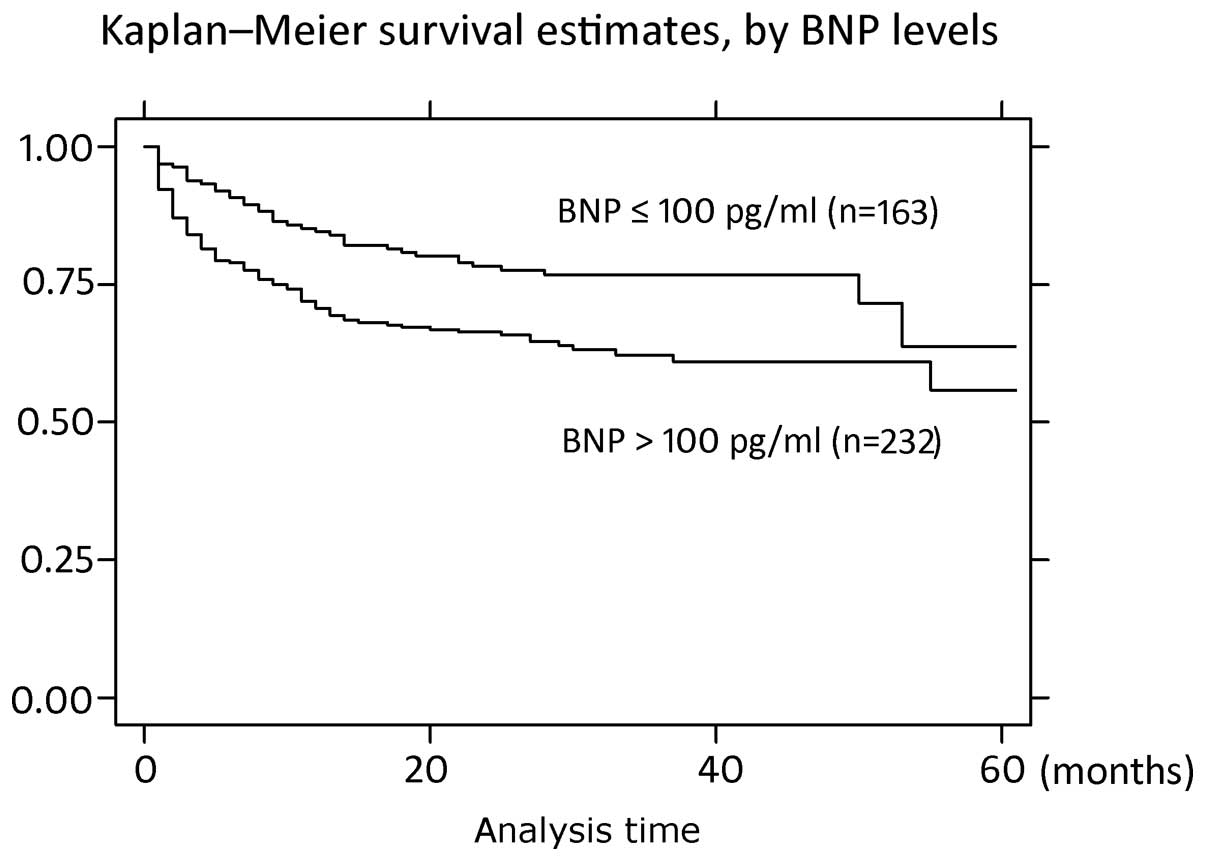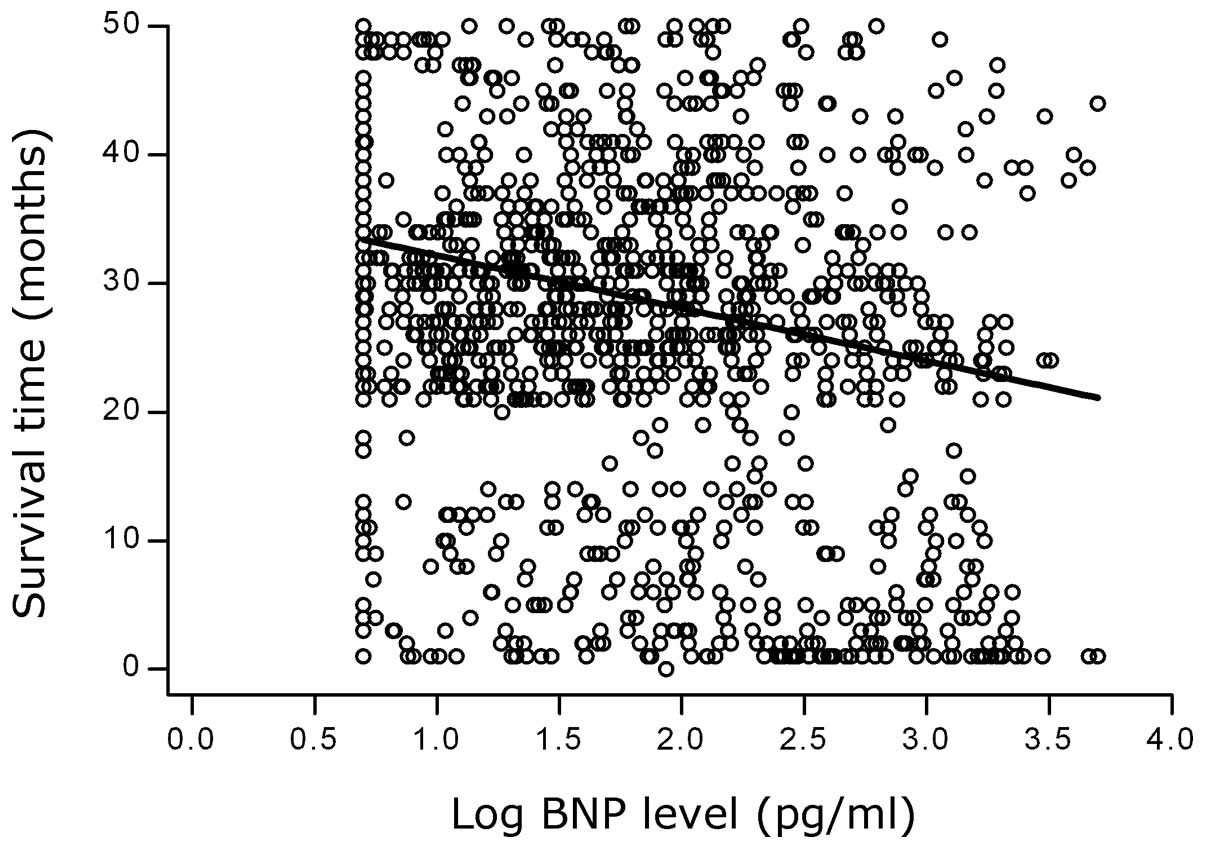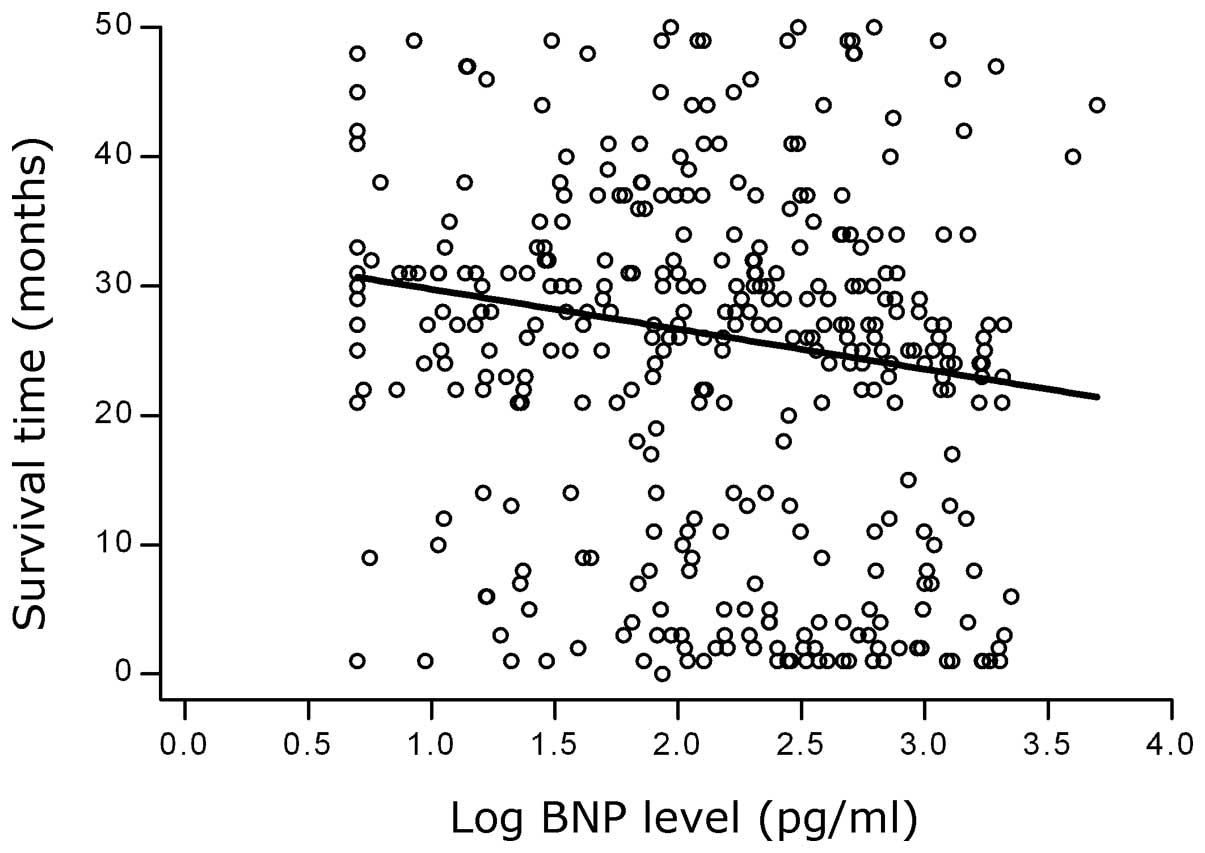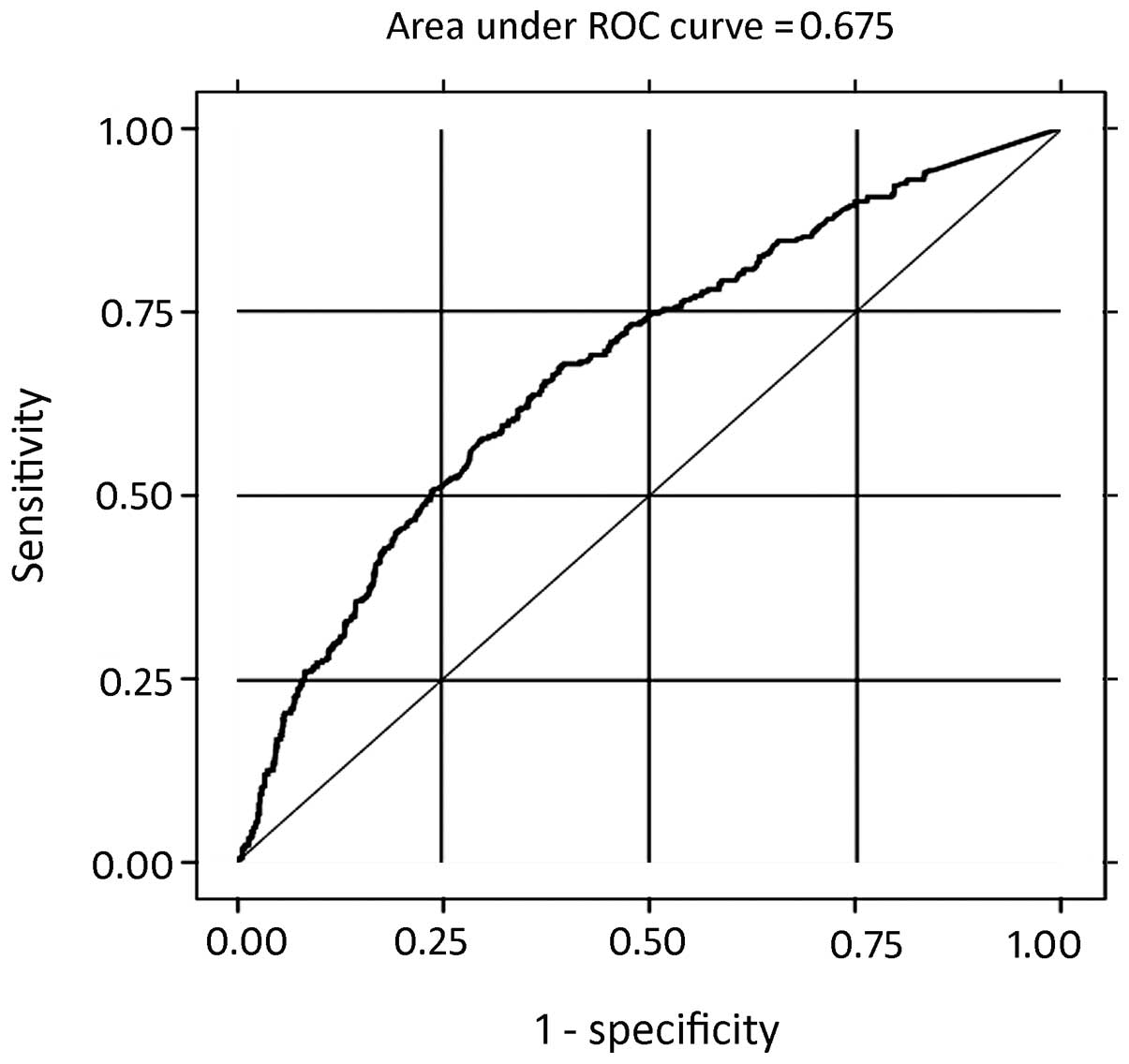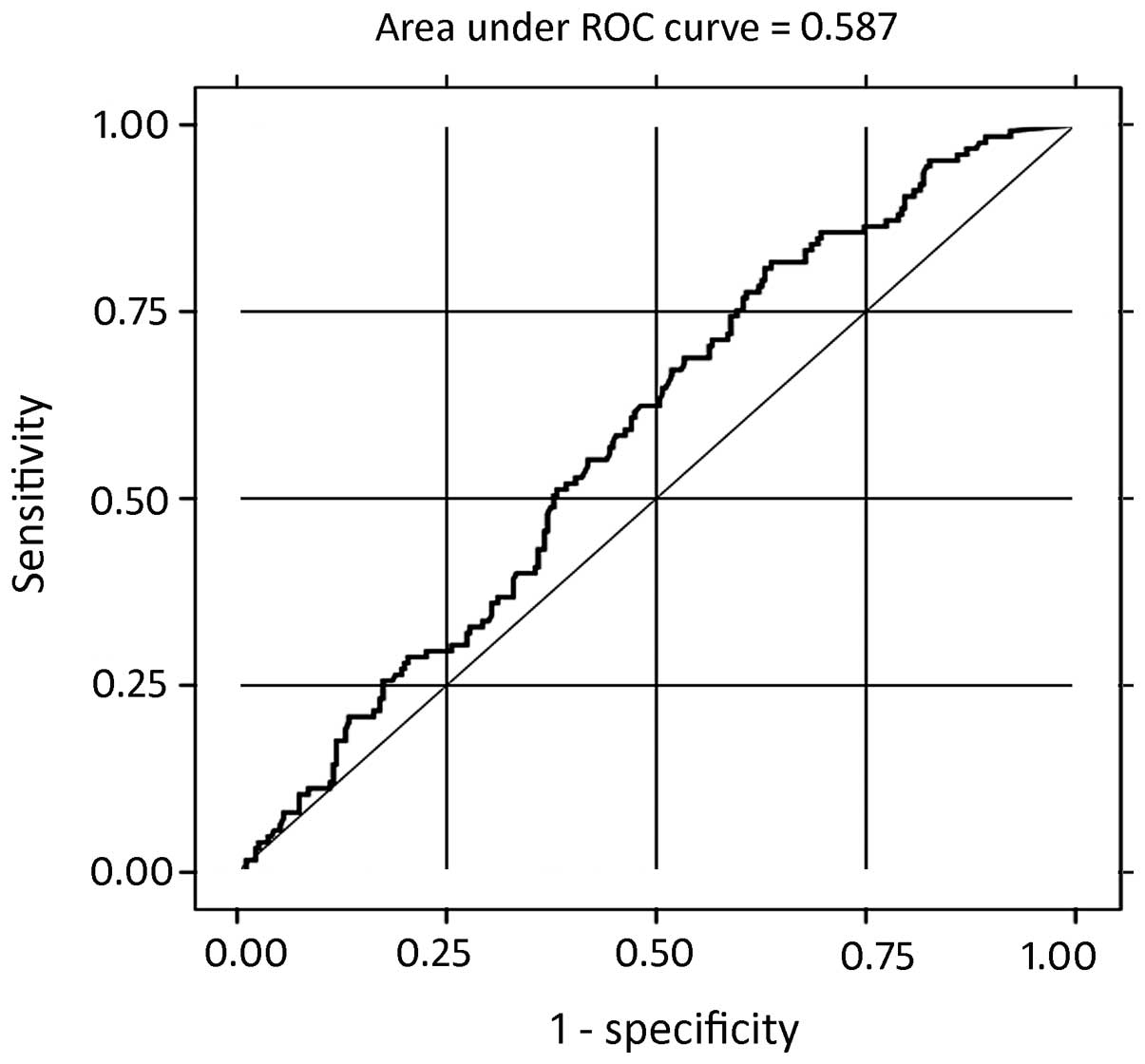|
1
|
Epshteyn V, Morrison K, Krishnaswamy P, et
al: Utility of B-type natriuretic peptide (BNP) as a screen for
left ventricular dysfunction in patients with diabetes. Diabetes
Care. 26:2081–2087. 2003. View Article : Google Scholar : PubMed/NCBI
|
|
2
|
Magnusson M, Melander O, Israelsson B, et
al: Elevated plasma levels of NT-proBNP in patients without overt
cardiovascular disease. Diabetes Care. 27:1929–1935. 2004.
View Article : Google Scholar : PubMed/NCBI
|
|
3
|
Kremastinos DT, Tsiapras DP, Kostopoulou
AG, et al: NT-proBNP levels and diastolic dysfunction in
beta-thalassaemia major patients. Eur J Heart Fail. 9:531–536.
2007. View Article : Google Scholar : PubMed/NCBI
|
|
4
|
Sakata K, Iida K, Mochiduki N and Nakaya
Y: Brain natriuretic peptide (BNP) level is closely related to the
extent of left ventricular sympathetic overactivity in chronic
ischemic heart failure. Intern Med. 48:393–400. 2009. View Article : Google Scholar
|
|
5
|
McKie PM, Rodeheffer RJ, Cataliotti A, et
al: Amino-terminal pro-B-type natriuretic peptide and B-type
natriuretic peptide: biomarkers for mortality in a large
community-based cohort free of heart failure. Hypertension.
47:874–880. 2006. View Article : Google Scholar : PubMed/NCBI
|
|
6
|
Krittayaphong R, Boonyasirinant T,
Saiviroonporn P, et al: Correlation between NT-pro BNP levels and
left ventricular wall stress, sphericity index and extent of
myocardial damage: a magnetic resonance imaging study. J Card Fail.
14:687–694. 2008. View Article : Google Scholar
|
|
7
|
Karaca II, Gülcü E, Yavuzkir M, et al:
B-type natriuretic peptide level in the diagnosis of asymptomatic
diastolic dysfunction. Anadolu Kardiyol Derg. 7:262–267.
2007.PubMed/NCBI
|
|
8
|
Kremastinos DT, Hamodraka E, Parissis J,
et al: Predictive value of B-type natriuretic peptides in detecting
latent left ventricular diastolic dysfunction in beta-thalassemia
major. Am Heart J. 159:68–74. 2010. View Article : Google Scholar : PubMed/NCBI
|
|
9
|
Panou FK, Kotseroglou VK, Lakoumentas JA,
et al: Significance of brain natriuretic peptide in the evaluation
of symptoms and the degree of left ventricular diastolic
dysfunction in patients with hypertrophic cardiomyopathy. Hellenic
J Cardiol. 47:344–351. 2006.PubMed/NCBI
|
|
10
|
Eroglu S, Yildirir A, Bozbas H, et al:
Brain natriuretic peptide levels and cardiac functional capacity in
patients with dyspnea and isolated diastolic dysfunction. Int Heart
J. 48:97–106. 2007. View Article : Google Scholar : PubMed/NCBI
|
|
11
|
Romano S, di Mauro M, Fratini S, et al:
Serial BNP assay in monitoring exercise tolerance in patients with
diastolic dysfunction. Int J Cardiol. 147:312–313. 2011. View Article : Google Scholar : PubMed/NCBI
|
|
12
|
Hunt SA, Abraham WT, Chin MH, et al:
ACC/AHA 2005 Guideline Update for the Diagnosis and Management of
Chronic Heart Failure in the Adult: a report of the American
College of Cardiology/American Heart Association Task Force on
Practice Guidelines (Writing Committee to Update the 2001
Guidelines for the Evaluation and Management of Heart Failure):
developed in collaboration with the American College of Chest
Physicians and the International Society for Heart and Lung
Transplantation: endorsed by the Heart Rhythm Society. Circulation.
112:e154–e235. 2005.
|
|
13
|
Teicholz LE, Kreulen T, Herman MV and
Gorlin R: Problems in echocardiographic volume determinations:
echocardiographic-angiographic correlations in the presence of
absence of asynergy. Am J Cardiol. 37:7–11. 1976.
|
|
14
|
Speranza L, Franceschelli S, Riccioni G,
et al: BNP and iNOS in decompensated chronic heart failure: a
linear correlation. Front Biosci (Elite Ed). 4:1255–1262. 2012.
View Article : Google Scholar : PubMed/NCBI
|
|
15
|
He Q, Wu G and Lapointe MC: Isoproterenol
and cAMP regulation of the human brain natriuretic peptide gene
involves Src and Rac. Am J Physiol Endocrinol Metab.
278:E1115–E1123. 2000.PubMed/NCBI
|
|
16
|
Suo M, Hautala N, Földes G, et al:
Posttranscriptional control of BNP gene expression in angiotensin
II-induced hypertension. Hypertension. 39:803–808. 2002. View Article : Google Scholar : PubMed/NCBI
|
|
17
|
James SK, Lindahl B, Siegbahn A, et al:
N-terminal pro-brain natriuretic peptide and other risk markers for
the separate prediction of mortality and subsequent myocardial
infarction in patients with unstable coronary artery disease: a
Global Utilization of Strategies To Open occluded arteries
(GUSTO)-IV substudy. Circulation. 108:275–281. 2003.
|
|
18
|
Morrow DA, de Lemos JA, Blazing MA, et al;
Investigators. Prognostic value of serial B-type natriuretic
peptide testing during follow-up of patients with unstable coronary
artery disease. JAMA. 294:2866–2871. 2005. View Article : Google Scholar : PubMed/NCBI
|
|
19
|
Morrow DA, de Lemos JA, Sabatine MS, et
al: Evaluation of B-type natriuretic peptide for risk assessment in
unstable angina/non-ST-elevation myocardial infarction: B-type
natriuretic peptide and prognosis in TACTICS-TIMI 18. J Am Coll
Cardiol. 41:1264–1272. 2003. View Article : Google Scholar : PubMed/NCBI
|
|
20
|
Ceriani L and Giovanella L: Cardiac
natriuretic peptides after myocardial infarction: relationship with
infarct size, left ventricular function and remodelling assessed by
99mTc-sestamibi gated-single photon emission tomography. Clin Chem
Lab Med. 45:226–231. 2007. View Article : Google Scholar
|
|
21
|
Kragelund C, Grønning B, Køber L, et al:
N-terminal pro-B-type natriuretic peptide and long-term mortality
in stable coronary heart disease. N Engl J Med. 352:666–675. 2005.
View Article : Google Scholar : PubMed/NCBI
|
|
22
|
Barbosa MM, Nunes Mdo C, Castro LR, et al:
Correlation between NT-pro BNP levels and early mitral annulus
velocity (E′) in patients with non-ST-segment elevation acute
coronary syndrome. Echocardiography. 25:353–359. 2008.PubMed/NCBI
|
|
23
|
Casco VH, Veinot JP, Kuroski de Bold ML,
et al: Natriuretic peptide system gene expression in human coronary
arteries. J Histochem Cytochem. 50:799–809. 2002. View Article : Google Scholar : PubMed/NCBI
|
|
24
|
Weber M, Dill T, Arnold R, et al:
N-terminal B-type natriuretic peptide predicts extent of coronary
artery disease and ischemia in patients with stable angina
pectoris. Am Heart J. 148:612–620. 2004. View Article : Google Scholar : PubMed/NCBI
|
|
25
|
Omland T: B-type natriuretic peptides:
prognostic markers in stable coronary artery disease. Expert Rev
Mol Diagn. 8:217–225. 2008. View Article : Google Scholar : PubMed/NCBI
|
|
26
|
Goetze JP, Christoffersen C, Perko M, et
al: Increased cardiac BNP expression associated with myocardial
ischemia. FASEB J. 17:1105–1107. 2003.PubMed/NCBI
|
|
27
|
Goetze JP, Gore A, Møller CH, et al: Acute
myocardial hypoxia increases BNP gene expression. FASEB J.
18:1928–1930. 2004.PubMed/NCBI
|
|
28
|
Omland T, Persson A, Ng L, et al:
N-terminal pro-B-type natriuretic peptide and long-term mortality
in acute coronary syndromes. Circulation. 106:2913–2918. 2002.
View Article : Google Scholar : PubMed/NCBI
|
|
29
|
de Lemos JA, Morrow DA, Bentley JH, et al:
The prognostic value of B-type natriuretic peptide in patients with
acute coronary syndromes. N Engl J Med. 345:1014–1021. 2001.
|
|
30
|
Kragelund C, Gustafsson I, Omland T, et
al: Prognostic value of NH2-terminal pro B-type
natriuretic peptide in patients with diabetes and stable coronary
heart disease. Diabetes Care. 29:1411–1413. 2006.
|
|
31
|
Kelder JC, Rutten FH and Hoes AW:
Clinically relevant diagnostic research in primary care: the
example of B-type natriuretic peptides in the detection of heart
failure. Fam Pract. 26:69–74. 2009. View Article : Google Scholar : PubMed/NCBI
|
|
32
|
Redfield MM, Jacobsen SJ, Burnett JC Jr,
et al: Burden of systolic and diastolic ventricular dysfunction in
the community: appreciating the scope of the heart failure
epidemic. JAMA. 289:194–202. 2003. View Article : Google Scholar : PubMed/NCBI
|
|
33
|
Shimabukuro M, Higa N, Oshiro Y, et al:
Diagnostic utility of brain-natriuretic peptide for left
ventricular diastolic dysfunction in asymptomatic type 2 diabetic
patients. Diabetes Obes Metab. 9:323–329. 2007. View Article : Google Scholar : PubMed/NCBI
|
|
34
|
Görmüş U, Ozmen D, Ozmen B, et al: Serum
N-terminal-pro-brain natriuretic peptide (NT-pro-BNP) and
homocysteine levels in type 2 diabetic patients with asymptomatic
left ventricular diastolic dysfunction. Diabetes Res Clin Pract.
87:51–56. 2010.PubMed/NCBI
|
|
35
|
Metra M, Ponikowski P, Dickstein K, et al;
Heart Failure Association of the European Society of Cardiology.
Advanced chronic heart failure: A position statement from the Study
Group on Advanced Heart Failure of the Heart Failure Association of
the European Society of Cardiology. Eur J Heart Fail. 9:684–694.
2007. View Article : Google Scholar : PubMed/NCBI
|
|
36
|
Nagueh SF, Appleton CP, Gillebert TC, et
al: Recommendations for the evaluation of left ventricular
diastolic function by echocardiography. J Am Soc Echocardiogr.
22:107–133. 2009. View Article : Google Scholar : PubMed/NCBI
|
|
37
|
Grewal J, McKelvie R, Lonn E, et al: BNP
and NT-proBNP predict echocardiographic severity of diastolic
dysfunction. Eur J Heart Fail. 10:252–259. 2008. View Article : Google Scholar : PubMed/NCBI
|
|
38
|
Kotaska K, Popelova J, Tiserova M, et al:
NT-proBNP and BNP values in cardiac patients with different degree
of left ventricular systolic dysfunction. Biomed Pap Med Fac Univ
Palacky Olomouc Czech Repub. 150:125–130. 2006. View Article : Google Scholar : PubMed/NCBI
|
|
39
|
Mair J, Hammerer-Lercher A and Puschendorf
B: The impact of cardiac natriuretic peptide determination on the
diagnosis and management of heart failure. Clin Chem Lab Med.
39:571–588. 2001. View Article : Google Scholar : PubMed/NCBI
|
|
40
|
Ruskoaho H: Cardiac hormones as diagnostic
tools in heart failure. Endor Rev. 24:341–356. 2003. View Article : Google Scholar : PubMed/NCBI
|
|
41
|
Ray P, Arthaud M, Birolleau S, et al:
Comparison of brain natriuretic peptide and probrain natriuretic
peptide in the diagnosis of cardiogenic pulmonary edema in patients
aged 65 and older. J Am Geriatr Soc. 53:643–648. 2005. View Article : Google Scholar : PubMed/NCBI
|
|
42
|
Sykes E, Karcher RE, Eisenstadt J, et al:
Analytical relationships among Biosite, Bayer, and Roche methods
for BNP and NT-proBNP. Am J Clin Pathol. 123:584–590. 2005.
View Article : Google Scholar : PubMed/NCBI
|
|
43
|
Fonarow GC; ADHERE Scientific Advisory
Committee. The Acute Decompensated Heart Failure National Registry
(ADHERE): opportunities to improve care of patients hospitalized
with acute decompensated heart failure. Rev Cardiovasc Med. 4(Suppl
7): S21–S30. 2003.
|
|
44
|
Vickery S, Price CP, John RI, et al:
B-type natriuretic peptide (BNP) and amino-terminal proBNP in
patients with CKD: relationship to renal function and left
ventricular hypertrophy. Am J Kidney Dis. 46:610–620. 2005.
View Article : Google Scholar : PubMed/NCBI
|
|
45
|
Richards AM, Nicholls MG, Espiner EA, et
al: B-type natriuretic peptides and ejection fraction for prognosis
after myocardial infarction. Circulation. 107:2786–2792. 2003.
View Article : Google Scholar : PubMed/NCBI
|















